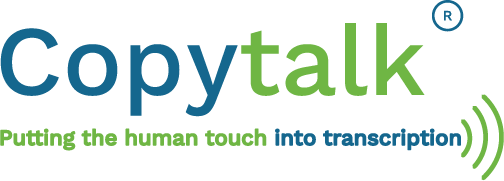How much of financial advisors’ time do you think is spent meeting with clients? 60 percent? Maybe 40 percent? As low as 30?
The answer might shock you: 20 percent.
That’s right, out of the 43 hours a week that financial advisors report working, only 20 percent is spent meeting with clients, according to a Kitces Research study of more than 1,000 advisors. That’s an average of 8.8 hours a week. Advisors spend much of their remaining time doing tasks such as preparing for client meetings – work that they could do more efficiently if they had third-party support such as Copytalk’s transcription services. Copytalk doesn’t eliminate these tasks, but it improves their quality and may reduce the time that advisors spent on them.
In other words, Copytalk is a tool that financial services firms can give their advisors to help them succeed, to help them make each year better than the last.
And to help enterprises make 2020 their best year yet, we at Copytalk have put together this checklist of four ways that they can increase their advisors’ productivity:
1. Give Your Advisors the Ability to Delegate Work to Support Services
Financial advisors spend more of their weekly work hours doing tasks behind the scenes than they meet with clients, according to the research study mentioned earlier. Advisors spend 5.3 hours per week, 12 percent of their work time, preparing for client meetings, and another 6.6 hours per week, or 15 percent, doing support work to answer client questions, the study found. Copytalk’s transcriptions can reduce the time that advisors spend preparing for meetings and doing other support work. Rather than wasting time looking through their own hastily prepared notes, advisors can simply quick-search through professionally prepared, secure transcriptions.
2. Help Your Advisors Prepare for Reg BI
3. Allow Your Advisors to Focus on Their Clients, Not Their Notes, at Meetings
One of the advantages that financial advisors have over roboadvisors is the ability to meet face-to-face. However, advisors who don’t use positive body language, such as maintaining eye contact, may be focusing insufficiently on the conversation and even unintentionally diminishing the interpersonal connection. It takes maintaining eye contact 60 to 70 percent of the time during a conversation to make an emotional connection, according to Inc. Yet advisors cannot make that eye contact if their noses are buried in a notepad or computer screen taking notes. Using Copytalker™, Copytalk’s new app that enables one-touch, on-screen dictation, the meeting can just go on naturally and we will transcribe the freeform dictation in whatever customized format the enterprise requires. This allows a firm’s advisors to direct their attention where it should be – at clients.
4. Give Your Advisors the Resources They Need to Pick Up Meetings Where They Left Off
Finally, neither your advisors nor their clients want to waste their valuable meeting time going over questions and details that they already went over before. Yet this is what happens when advisors go into meetings with only an approximate idea of where the last meeting left off. Fortunately, by using Copytalk, advisors can simply check the transcription of their last meeting with a client and start the new meeting exactly where the last one left off.
For Enterprise and Group Special Pricing, Please Contact Our Enterprise Concierge: info@copytalk.com
